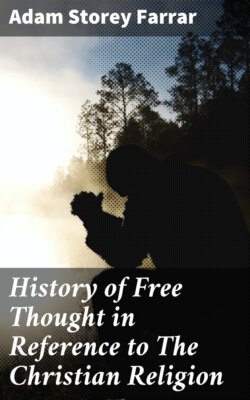Читать книгу History of Free Thought in Reference to The Christian Religion - Adam Storey Farrar - Страница 4
На сайте Литреса книга снята с продажи.
Lecture I.
ОглавлениеTable of Contents
On the subject, method, and purpose of the course of Lectures.
The subject stated to be the struggle of the human mind against the Christian revelation, in whole or in part. (p. 1.) Explanation of the points which form the occasion of the conflict. (pp. 1–3.)
The mode of treatment, being that of a critical history, includes (p. 3) the discovery of (1) the facts, (2) the causes, and (3) the moral.
The main part of this first lecture is occupied in explaining the second of these divisions.
Importance, if the investigation were to be fully conducted, of carrying out a comparative study of religions and of the attitude of the mind in reference to all doctrine that rests on authority. (pp. 4–6.)
The idea of causes implies,
I. The law of the operation of the causes.
II. The enumeration of the causes which act according to this assumed law.
The empirical law, or formula descriptive of the action of reason on religion, is explained to be one form of the principle of progress by antagonism, the conservation or discovery of truth by means of inquiry and controversy; a merciful Providence leaving men responsible for their errors, but ultimately overruling evil for good. (p. 7.)
This great fact illustrated in the four Crises of the Christian faith in Europe, viz. In the struggle
(1) With heathen philosophy, about A.D. 160–360. (p. 8.)
(2) With sceptical tendencies in Scholasticism, in the middle ages (1100–1400). (p. 8.)
(3) With literature, at the Renaissance, in Italy (1400–1625). (p. 9.)
[pg xxxii]
(4) With modern philosophy in three forms (p. 11): viz. English Deism in the seventeenth and eighteenth centuries (p. 11); French Infidelity in the eighteenth century; German Rationalism in the eighteenth and nineteenth.
Proposal to study the natural as well as literary history of these forms of doubt.—The investigation separated from inquiries into heresy as distinct from scepticism. (p. 13.)
The causes, seen to act according to the law just described, which make free thought develope into unbelief, stated to be twofold. (p. 13.)
1. Emotional causes.—Necessity for showing the relation of the intellectual causes to the emotional, both per se, and because the idea of a history of thought, together with the comparative rarity of the process here undertaken, implies the restriction of the attention mainly to the intellectual. (p. 13.)
Influence of the emotional causes shown, both from psychology and from the analysis of the nature of the evidence offered in religion (pp. 14, 15).—Historical illustrations of their influence. (pp. 15–17.)
Other instances where the doubt is in origin purely intellectual (p. 17), but where nevertheless opportunity is seen for the latent operation of the emotional. (p. 18.)
Explanation how far religious doubt is sin. (pp. 19, 20.)
2. Intellectual causes, which are the chief subject of these lectures; the conjoint influence however of the emotional being always presupposed.
The intellectual causes shown to be (p. 20):
(α) the new material of knowledge which arises from the advance of the various sciences; viz. Criticism; Physical, Moral, and Ontological science. (p. 21.)
(β) the various metaphysical tests of truth or grounds of certitude employed. (p. 22.)
An illustration of the meaning (pp. 22, 23), drawn from literature, in a brief comparison of the types of thought shown in Milton, Pope, and Tennyson.
Statement of the exact position of this inquiry in the subdivisions of metaphysical science (pp. 24, 25), and detailed explanation of the advantages and disadvantages of applying to religion the tests of Sense, subjective Forms of Thought, Intuition, and Feeling, respectively; as the standard of appeal. (pp. 25–32.)
Advantage of a biographic mode of treatment in the investigation of the operation of these causes in the history of doubt. (pp. 32–34.)
[pg xxxiii]
Statement of the utility of the inquiry:
(1) Intellectually, (α) in a didactic and polemical point of view, in that it refers the origin of the intellectual elements in error to false philosophy and faulty modes of judging, and thus refutes error by analysing it into the causes which produce it; and also (β) in an indirect contribution to the Christian evidences by the historic study of former contests. (p. 36.)
(2) Morally, in creating deep pity for the sinner, united with hatred for the sin. (p. 36.)
Concluding remarks on the spirit which has influenced the writer in these lectures. (pp. 37, 38.)
